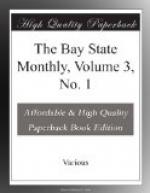Russia, Prussia, France, and Austria, were inclined to that measure; England dissented and protested, but the course was agreed upon; and France, with the consent of these other continental powers, took the conduct of the operation into her own hands. In the spring of 1823, a French army was sent into Spain. Its success was complete; the popular government was overthrown, and Ferdinand was re-instated and re-established in all his power. This invasion was determined on and undertaken precisely on the doctrines which the allied monarchs had proclaimed the year before at Laybach; that is, that they had the right to interfere in the concerns of another State, and reform its government, “in order to prevent the effect of its bad example” (this bad example, be it remembered, always being the example of free government by the people). Now having put down the example of the Cortes, in Spain, it was natural to inquire, with what eyes they should look on the Colonies of Spain, that were following still worse examples. Would King Ferdinand and his allies be content with what had been done in Spain itself, or would he solicit their aid and would they grant it, to subdue his rebellious American colonies?
Having “reformed” Spain herself to the true standard of a proud monarchy, it was more than probable that they might see fit to attempt the “reformation” and re-organization of the Central and South American Colonies, which were following the “pernicious example of the United States,” and declaring themselves “free and independent,” it being an historical fact, that as soon as the Spanish King was completely reestablished he invited the co-operation of his allies in regard to his provinces in South America, to “assist him to readjust the affairs in such manner as should retain the sovereignty of Spain over them.” The proposed meeting of the allies for that purpose, however, did not take place. England had already taken a decided course, and stated distinctly, and expressly, that “she should consider any foreign interference by force or by menace, in the dispute between Spain and the Colonies, as a motive for recognizing the latter without delay.”
The sentiment of the liberty-loving people of the American Union was strongly in favor of the independence of the Colonies, which our government had already recognized; and it was at this crisis, just as the attitude of England was made known, that President Monroe’s noble and patriotic declaration was made. Its effect was grand; it disarmed all organized attempts on the part of Spain and her allies to re-organize her “rebellious colonies”—now our sister republics in the western hemisphere—and shook the political systems of the world to their centres.
“The force of President Monroe’s declaration,” said Daniel Webster, “was felt everywhere by all those who could understand its object, and foresee its effect.” Lord Brougham said in Parliament that “no event had ever created greater joy, exaltation, and gratitude, among all the freemen in Europe;” that he felt “proud in being connected by blood and language with the people of the United States;” that “the policy disclosed by the message became a great, a free, an independent nation.”




